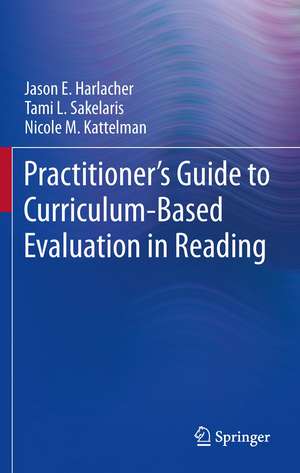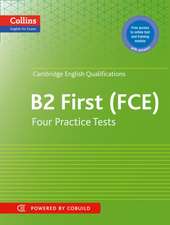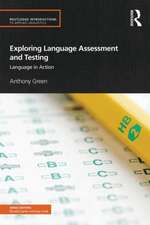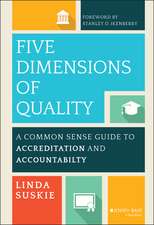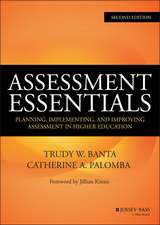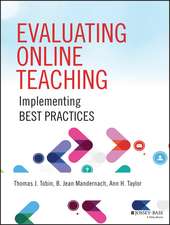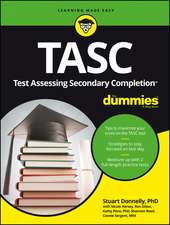Practitioner’s Guide to Curriculum-Based Evaluation in Reading
Autor Jason E. Harlacher, Tami L. Sakelaris, Nicole M. Kattelmanen Limba Engleză Hardback – 12 dec 2013
The educators are dedicated and concerned. The curriculum is successful. Yet some students aren't reading at grade level, and meetings air problems without making progress. Many students continue to flounder, leading to more meetings with the same lack of meaningful results.
The Practitioner’s Guide to Curriculum-Based Evaluation in Reading gives researchers and professionals the means to break this frustrating cycle, crafted by authors who have not only been there and done that, but can explain in depth how to replicate the method. Focusing on reading but applicable across subject areas, this highly accessible guide defines curriculum-based evaluation (CBE), provides conceptual background, and analyzes its component steps. Assessment and intervention are given equal attention within a problem-solving model featuring tools for skill assessment, progress monitoring, goal setting, and other bedrock tasks. Chapters build to lead readers beyond classroom strategies to guidelines for problem solving and decision making to effectively address individual student needs.
Included in the coverage:
- The curriculum-based evaluation process.
- Relating CBE to the Multi-Tier System of Support model.
- Using CBE in daily practice, both in classwork and schoolwide.
- Decoding, early literacy, and reading comprehension.
- Progress monitoring and decision making.
- Plus FAQs, handouts, and other supplemental materials.
This level of educational insight and pedagogical detail make the Practitioner’s Guide to Curriculum-Based Evaluation in Reading a clarion call for researchers, graduate students, and professionals in school and clinical childpsychology; assessment, testing, and evaluation; applied linguistics; language education; special education and allied education; educational psychology; and social work.
| Toate formatele și edițiile | Preț | Express |
|---|---|---|
| Paperback (1) | 389.70 lei 6-8 săpt. | |
| Springer – 24 sep 2016 | 389.70 lei 6-8 săpt. | |
| Hardback (1) | 397.16 lei 6-8 săpt. | |
| Springer – 12 dec 2013 | 397.16 lei 6-8 săpt. |
Preț: 397.16 lei
Nou
Puncte Express: 596
Preț estimativ în valută:
75.99€ • 79.35$ • 62.90£
75.99€ • 79.35$ • 62.90£
Carte tipărită la comandă
Livrare economică 04-18 aprilie
Preluare comenzi: 021 569.72.76
Specificații
ISBN-13: 9781461493594
ISBN-10: 1461493595
Pagini: 324
Ilustrații: XVII, 303 p. 97 illus.
Dimensiuni: 155 x 235 x 22 mm
Greutate: 0.63 kg
Ediția:2014
Editura: Springer
Colecția Springer
Locul publicării:New York, NY, United States
ISBN-10: 1461493595
Pagini: 324
Ilustrații: XVII, 303 p. 97 illus.
Dimensiuni: 155 x 235 x 22 mm
Greutate: 0.63 kg
Ediția:2014
Editura: Springer
Colecția Springer
Locul publicării:New York, NY, United States
Public țintă
Professional/practitionerCuprins
Foreword.- Chapter 1. Introduction.- Part I. Background of Education and Curriculum-Based Evaluation.- Chapter 2. History of Education.- Chapter 3. Multi-Tiered System of Support.- Chapter 4. What is Curriculum-Based Evaluation?.- Chapter 5. The Curriculum-Based Evaluation Process.- Part II. Using Curriculum-Based Evaluation.- Chapter 6. CBE Decoding.- Chapter 7. CBE Early Literacy.- Chapter 8. Reading Comprehension.- Part III. Making Educational Decisions with CBE.- Chapter 9. Using Curriculum-Based Evaluation in Daily Practice.- Chapter 10. Progress Monitoring and Educational Decisions.- Chapter 11. Common and Frequently Asked Questions about CBE.- Part IV. Additional Material.- Appendices.- Glossary of Terms.- References.
Notă biografică
Jason Harlacher, Ph.D., is a nationally certified school psychologist with more than 10 years of experience in education. Dr. Harlacher has worked as a school psychologist, a MTSS consultant, and as the state director for PBS-Nevada. Dr. Harlacher currently works as a researcher and adjunct professor in Denver, Colorado. Dr. Harlacher presents nationally on school-wide prevention models and has published articles on RTI, social-emotional learning, and class-wide interventions for ADHD. Dr. Harlacher earned his master’s degree in School Psychology from Utah State University in 2006 and his doctorate in School Psychology from the University of Oregon in 2009.
Tami L. Sakelaris, Ph.D., is a nationally certified school psychologist currently working as a School Psychologist and consultant, coach and trainer for Multi-Tiered Systems of Support in Washoe County School District in Reno, Nevada. Dr. Sakelaris has worked in education for more than 16 years, which includes over 7 years as an MTSS External Coach. Dr. Sakelaris earned her doctorate in School Psychology from the University of Oregon in 1998.
Nicole Kattelman, M.S., is a licensed school psychologist with over 15 years of experience in education. She received her master’s in 1996 in school psychology from California State University, Hayward. She has worked as a school psychologist at both the elementary and secondary levels, and has supported her current school district with the implementation of Multi-Tiered Systems of Support. She has presented both nationally and locally on the implementation of Multi-Tiered Systems of Support at the secondary level. Nicole currently works as a school psychologist and as a district consultant for Multi-Tiered Systems of Support.
Tami L. Sakelaris, Ph.D., is a nationally certified school psychologist currently working as a School Psychologist and consultant, coach and trainer for Multi-Tiered Systems of Support in Washoe County School District in Reno, Nevada. Dr. Sakelaris has worked in education for more than 16 years, which includes over 7 years as an MTSS External Coach. Dr. Sakelaris earned her doctorate in School Psychology from the University of Oregon in 1998.
Nicole Kattelman, M.S., is a licensed school psychologist with over 15 years of experience in education. She received her master’s in 1996 in school psychology from California State University, Hayward. She has worked as a school psychologist at both the elementary and secondary levels, and has supported her current school district with the implementation of Multi-Tiered Systems of Support. She has presented both nationally and locally on the implementation of Multi-Tiered Systems of Support at the secondary level. Nicole currently works as a school psychologist and as a district consultant for Multi-Tiered Systems of Support.
Textul de pe ultima copertă
The educators are dedicated and concerned. The curriculum is successful. Yet some students aren't reading at grade level, and meetings air problems without making progress. Many students continue to flounder, leading to more meetings with the same lack of meaningful results.
The Practitioner’s Guide to Curriculum-Based Evaluation in Reading gives researchers and professionals the means to break this frustrating cycle, crafted by authors who have not only been there and done that, but can explain in depth how to replicate the method. Focusing on reading but applicable across subject areas, this highly accessible guide defines curriculum-based evaluation (CBE), provides conceptual background, and analyzes its component steps. Assessment and intervention are given equal attention within a problem-solving model featuring tools for skill assessment, progress monitoring, goal setting, and other bedrock tasks. Chapters build to lead readers beyond classroom strategies to guidelines for problem solving and decision making to effectively address individual student needs.
Included in the coverage:
- The curriculum-based evaluation process.
- Relating CBE to the Multi-Tier System of Support model.
- Using CBE in daily practice, both in classwork and schoolwide.
- Decoding, early literacy, and reading comprehension.
- Progress monitoring and decision making.
- Plus FAQs, handouts, and other supplemental materials.
This level of educational insight and pedagogical detail make the Practitioner’s Guide to Curriculum-Based Evaluation in Reading a clarion call for researchers, graduate students, and professionals in school and clinical childpsychology; assessment, testing, and evaluation; applied linguistics; language education; special education and allied education; educational psychology; and social work.
Caracteristici
Only curriculum-based evaluation resource to focus specifically on reading Includes many user-friendly resources, such as ready-to-use handouts and assessment templates Details a problem-solving assessment strategy that specifically identifies how to improve student learning Provides in depth instruction on using curriculum-based evaluation within multi-tiered problem-solving models Includes supplementary material: sn.pub/extras
